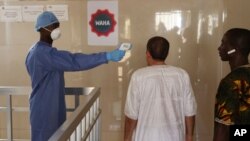The World Health Organization announced Tuesday that the Ebola outbreak in West Africa no longer qualifies as an extraordinary event, and "the risk of international spread is now low."
While the disease is no longer thought to be a public health threat, officials with the WHO are still urging those countries that were effected to be vigilant.
“Work must continue on the use of Ebola vaccination for intimate and close contacts of those survivors who have persistent virus excretion,” the group said in a statement. “Particularly important will be to ensure that communities can rapidly and fully engage in any future response, cases are quickly isolated and managed, local population movement in the affected areas is managed, and appropriate contact lists are shared with border authorities.”
The WHO acknowledged that a small number of new clusters of Ebola cases are still occurring in Guinea, but Sierra Leone and Liberia have not experienced any new cases in months. Guinea has seen 12 such flare-ups to date, the most recent occurring March 17, but they are decreasing in frequency.
Since the outbreak began in December 2013, nearly 11,000 people died in the three countries, with most deaths occurring in Guinea.
Each of the three countries previously declared an end to Ebola transmission, but later saw new cases flare-up.
WHO: Ebola No Longer Extraordinary Health Risk




